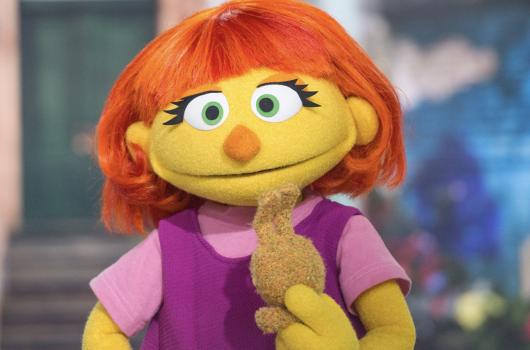Most children with autism, the neurodevelopment disorder that affects an estimated 1 in 59 children, aren’t diagnosed until they are 4 or 5 years old. This is in spite of the fact that children as young as 18 months can be reliably diagnosed. And in news that surprises no one, delayed diagnosis is even greater in minority and low-income children.
But earlier diagnosis helps children with the disorder maximize their development potential. That’s why Autism Speaks and Sesame Workshop joined forces to promote early screening and diagnosis with a multimedia campaign starring Julia, the 4-year-old “Sesame Street” muppet with autism who was introduced to the world two years ago.
“Autism is a brain difference that starts really early in life, probably during pregnancy,” Thomas Frazier, Ph.D., Autism Speaks’ chief science officer, told Black Health Matters in a recent phone interview. “In kids as early as 9 months, you can see if they are sharing smiles and facial expressions with their mother or caregiver. Are they babbling? Are they pointing or responding to their name?”
He also directed attention to a new study which found autism can be diagnosed in children as young as 14 to 15 months. “It’s why universal screening at 18 to 24 months [recommended by the American Academy of Pediatrics] is so important. Obviously age 4 is much later than we would like because we can diagnose much earlier and get them intervention.”
And this screening, diagnosis and intervention information is what the Autism Speaks-Sesame Workshop collaboration is attempting to relay to parents.
“It’s a great mechanism to get the issue out there, because kids can be diagnosed reliably early,” Frazier said. “‘Sesame Street’ has this great relationship with children and parents of children. We can talk about what is autism, what’s the value of early diagnosis, and get the word out about screening.”
The series of English and Spanish videos show Julia interacting in her unique way in everyday activities with her friends and family. In one of the PSAs that’s part of the campaign, Julia has a speech generating device because she’s mostly nonverbal. She calls it a talker. “Because she’s using it, she’s communicating well,” Frazier said. “It lets people know if you run into a person with a speech generating device in the grocery store, you’ll know it’s a device used by someone with autism. It gets people used to these behaviors.”
The campaign is also beneficial in helping Autism Speaks share available treatment and support, including speech and occupational therapies, behavioral therapies that teach children with autism what they need to do to perform daily living skills, and social skills, such as shaking hands and looking someone in the eye.
“You want to teach kids to exhibit the social skills we all need,” Frazier said. “Can you be friendly with people as a way to get into a relationship? Are you able to exhibit the skills you need to develop a friendship. Can you finish a conversation? Maintain an appropriate distance from someone? These are all skills neurotypical people take for granted. We’re just teaching them more actively in people with autism.”
Parents who have concerns about their children or who have a child who may have just received an autism diagnosis can also find a wealth of free resources at ScreenForAutism.org. They can also connect with a resource team at Autism Speaks’ helpline, 888-AUTISM2.
“We focus a lot of our attention on developing resources,” Frazier said. “There are toolkits for adult transition, dental visits and resources for friends and family members. It’s so important in African American and Hispanic communities. We really want to close the gap.”





